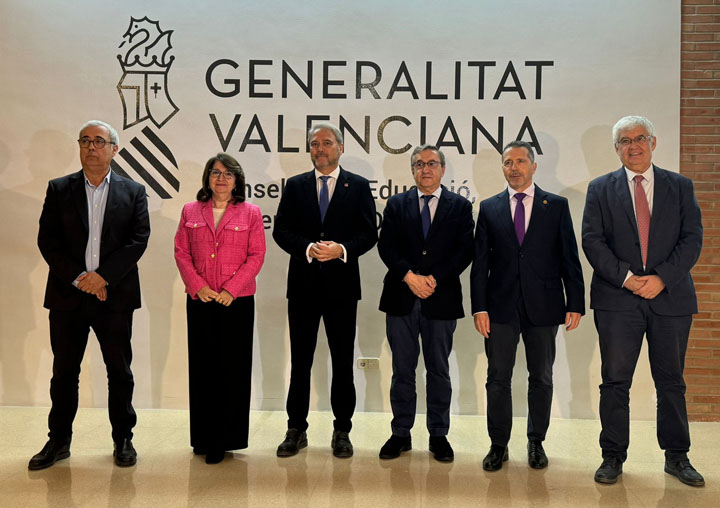Valencian public universities generate almost 50,000 jobs and raise average salaries by 11%
- Press Office
- March 25th, 2024

Valencian public universities and their associated activity generate 2,715 million euros of income in the Valencian Community and 49,726 jobs, which represents 2.2% of Valencian GDP and 2.4% of employment. The data comes from the fifth report 'The socio-economic contributions of Valencian public universities', prepared by the Ivie research team. The report was commissioned by the five Valencian public universities.
According to the data presented on Monday, the Valencian public university system (SUPV) returns to society, through the additional tax revenue generated by its graduates, 3.1 euros for every euro that public administrations allocate to its operation. Compared to the 933 million euros a year in current public transfers that the SUPV receives, its graduates contribute 2,901 million euros more in taxes than they would have generated if they did not have these university studies, given that they have more jobs and earn higher incomes.
The presentation of the study, held in Valencia in the auditorium of the Department of Education, Universities and Employment, was attended by the councillor José Antonio Rovira; the vice-principal for Economics and Infrastructure of the UV, Justo Herrera Gómez; the principal of the Universitat Politècnica de València, Jose E. Capilla; the principal of the University of Alacant, Amparo Navarro; the vice-principal for Economic and Strategic Planning of the Universitat Jaume I, Modesto Fabra; and the principal of the Miguel Hernández University of Elche, Juan José Ruiz Martínez. José Manuel Pastor, Ivie researcher and director of the report, will detail the main results.
The five universities that make up the SUVP -University of Alacant, Universitat Jaume I, Miguel Hernández University, Universitat Politècnica de València and Universitat de València- accounted for 78.2% of undergraduate students, 44.9% of master's degree students, 93.5% of scientific output and 100% of national patent filings obtained by all universities located in the Valencian Community during the 2022 - 2023 academic year. Collectively, public universities educate 70.4% of the Community's undergraduate and Master's students. However, despite this majority percentage, public institutions have fallen in importance in the aggregate to private universities. Undergraduate enrolment in the SUPV has contracted by 22.2% since the 2010 - 2011 academic year, while the private system has increased its student body by 113.5% in the same period. In the case of master's degrees, there has been a significant increase in demand in both cases. The number of people enrolling in a Master's degree at a Valencian public university has increased by 48.6% in the period analysed, a substantial increase but lower than that of private universities, which have gone from 13.5% of students in this type of study to 55.1%.
To attend to their students and carry out their research work, the Valencian public universities have 12 campuses with 60 centres, including their own and affiliated centres, and a budget of 1,515 million euros in the 2022 - 2023 academic year. This figure represents an increase of only 1.8% compared to the budget for the 2010 - 2011 academic year. 62% of the income comes from current transfers from the public administration, to cover the running of the institutions, another 22% from capital transfers, to cover new investments, and the remaining 16% from other income, including tuition fees paid by students.
Altogether, the five institutions offer 234 degree programmes, 339 official master’s degrees and 139 doctoral programmes. In the period under analysis there has been a change in the specialisation of education. While the percentage of students enrolled in engineering and architecture degrees has decreased by -6.6% (-5.8% at national level), the number of students who have opted for Health Sciences has increased by 6.4% (7.4% in Spain). The report warns, once again (as already warned in the previous 2019 report), of the loss of students enrolling in a degree or master's degree in STEM (science, technology, engineering and mathematics) fields, despite the strong labour market demand for these graduates.
The factors that determine the choice of a university have changed in recent years. The criterion of proximity has lost relevance and the proliferation of private universities has boosted competition. SUPV institutions have oriented their strategy towards attracting students with high academic records and promoting the exclusivity of degrees. In the academic year 2022 - 2023, a quarter of the degrees offered by SUPV are exclusive, i.e. they are not offered by any other university. The greatest exclusivity is observed in the areas of engineering and architecture (32%), followed by the humanities (30.8%).
In the strategy to attract students, the increase in the number of students from outside the Valencian Community stands out. While in the 2010 - 2011 academic year this student body accounted for 10.1% of the total, it has increased by 7.7 percentage points to 17.9% in 2022 - 2023. Master's students from outside the Community have also increased, from 25.5% a decade ago to 36.2% in the academic year 2022 - 2023.
Mobility programmes, both national and international (Erasmus +, SICUE Exchange System between Spanish University Centres and other international programmes), have had a very positive influence on attracting students from outside the Community. Almost 6,000 undergraduate students and 560 master's degree students from other regions or abroad have arrived at one of the SUPV universities through mobility programmes in the 2022 - 2023 academic year. Their spending in the Community has an important economic impact, as it represents 21.2 million euros in income for the Valencian Community and the creation of 610 jobs.
Other contributions from the SUVP
Along with the economic impact of Valencian public universities, the report analyses their contribution in other aspects derived from their research and transfer activity. SUVP universities play a crucial role in the generation of qualified human capital and in the production of knowledge, surpassing their national counterparts in terms of responsibility. Of the total investment in R&D in the Valencian Community, 42.7% is made by the higher education sector, a percentage much higher than the national average (26%) and that of benchmark regions such as the Basque Country (16.8%), Madrid (18.7%) and Catalonia (19.8%).
In terms of SUPV research activity, the volume of scientific publications has grown more than the national average, with the number of scientific articles doubling from 4,945 in 2010 to 10,080 in 2021. Practically all research activity in the Valencian Community is carried out by public universities, as they generated 95.8% of the scientific publications in the Community between 2010 and 2021. Valencian public universities also stand out for their patenting activity. In 2021, 100% of the 39 national patent filings arising from university research came from a SUPV institution. The evolution of the SUPV's patenting activity is more positive than in Spain as a whole. As a result, the SUPV's share in the Spanish public university system (SUPE) has risen from 10% of national patent filings to 20%.
Universities and employment quality
The study of the contribution of Valencian public universities also devotes a chapter to assessing the role of the SUPV in the quality of employment in the Valencian Community. To this end, it has compared the employment conditions of university graduates with those of individuals with post-compulsory secondary education or Higher National Diploma. The results indicate that university graduates in the Community enjoy a higher percentage of permanent contracts in the private sector and a lower percentage of unwanted part-time jobs than workers with post-compulsory secondary education (+4.2 and -2.8 percentage points, respectively). In addition, graduates earn higher wages and are less likely to work long hours. According to the report, they are less actively looking for another job, participate more in continuing education and training and have more access to high-skilled jobs and teleworking.
However, not all job quality indicators are positive for university graduates, as they face more unpaid overtime, unplanned changes in working hours, work pressure and out-of-hours contacts than workers with post-compulsory secondary education.
The document also quantifies the contribution of the SUPV to the average quality of employment in the Community. Thanks to the contribution of the SUPV in the Community, the percentage of employees with undesired part-time working hours is reduced by 0.8 percentage points, the weight of teleworking increases by 4.8 points, the percentage of workers in highly qualified occupations increases by 15.9 points and the percentage of workers participating in continuing education and training rises by 3.5 points. Moreover, the average wage in the Valencian Community is 11% higher due to the contribution of SUPV-qualified workers and, according to estimates, without the SUPV, the unemployment rate in the Community would be 2 percentage points higher.
The SUPV therefore becomes a crucial agent for the development of the Community. A good university system provides highly qualified workers, which promotes a productive, innovative and human capital-based business fabric. This, in turn, generates quality employment and stimulates investment in higher education, boosting economic resilience, especially in times of crisis.
The report just published is the fifth in a series that began in 2009 and was followed by editions in 2013, 2015 and 2019. The aim of these documents, which are now updated with the new study, is to show society the social and economic contributions made by Valencian public universities through their teaching, research and transfer activities.
File in: Sistemes d'informació universitària
















